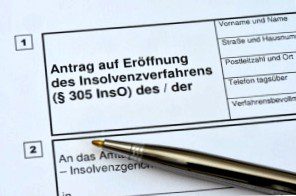Residual debt discharge: long-awaited end of private insolvency

Private insolvency is a court procedure that helps over-indebted people to finally become debt-free. At the end of this procedure is the so-called residual debt discharge – the release from all remaining debts. To find out how you can achieve this, how long it takes to get there and when the discharge of residual debt can be denied, read the following guidebook.
FAQ: Residual debt discharge at the end of private insolvency
What does it mean when the discharge of residual debt has been granted??
In this case, you will be released from (almost) all outstanding debts. Creditors can therefore no longer carry out seizures or other enforcement measures. You can find out which requirements must be met here.
How long does the residual debt discharge last??
If you have filed a petition for the opening of insolvency proceedings from 1. October 2020, the duration of the private insolvency is three years.
What happens after the discharge of residual debt has been granted??
After the exemption is granted, the insolvency ends. Creditors can no longer enforce old claims. You no longer have to hand over the attachable part of your income to the insolvency administrator. If you have agreed to pay the costs of the proceedings in installments, you will have to pay them off for a maximum of 48 months.
What does discharge of residual debt mean for insolvency debtors??

What is meant by the discharge of residual debt? With it usually ends the private insolvency. It has the effect that (almost) all remaining debts of the insolvency debtor are eliminated.
This means that creditors can no longer claim the money – regardless of whether you had filed claims in the insolvency proceedings or not.
However, there are certain claims that remain even after the discharge of residual debt. These include fines, penalties, certain outstanding alimony payments, and interest-free loans used to pay the costs of the proceedings.
Many insolvency debtors ask themselves when exactly the discharge of residual debt becomes legally binding. In principle, the competent insolvency court grants residual debt discharge at a final hearing. However, the legal effect does not occur until a little later, namely when the appeal period has expired. This lasts two weeks.
Under what conditions will discharge from debt be granted?

In order for all remaining debts to be discharged at the end of the private insolvency, you must file an application for residual debt discharge with the relevant insolvency court. This step must be completed either when you file for insolvency proceedings or shortly thereafter.
In order for your private insolvency to end successfully, you must also follow certain rules during the usually three-year period of good conduct. These included the following:
- You must be in suitable gainful employment or make demonstrable efforts to find such employment.
- You must surrender the attachable portion of your income to the insolvency administrator.
- If you move or change jobs, you must notify the court of this.
When residual debt discharge may be denied?
Under certain conditions, private insolvency ends without discharge of residual debt – this can also be refused by the court. The result is that the entire proceedings are in vain. The debts remain and creditors can again resort to enforcement measures.
In order for the discharge of residual debt to be denied, one of the creditors must apply for it. In addition, there must be a reason for refusal. These include, but are not limited to, the following:
- Violation of the obligations to provide information and cooperation
- Squandering of assets in the three years prior to insolvency
- Violation of the obligation to work
- Insolvency offense
- Incorrect or incomplete information on assets and income
When is discharge of residual debt granted in insolvency proceedings??

Private insolvency is a very difficult and rocky road for the debtor. If the debtor receives an inheritance during this period, he must hand over the entire sum to the insolvency administrator.
Quite a few of those affected therefore ask themselves: When does the discharge of residual debt begin?? The duration of private insolvency for proceedings that begin on or after 1. If the insolvency proceedings were filed on October 1, 2020, they usually last three years.
The granting of residual debt discharge therefore takes place three years after the proceedings have been officially opened.
Please note, however, that for proceedings commenced before 1. If you apply for a discharge of debts on or after October 2020, different rules apply. Here, the discharge of residual debt usually takes place after up to six years.
Under what conditions is early discharge of residual debt possible??
If you have filed your application for insolvency as of 1 January 2009, you will receive a discharge of residual debt. October 2020, then there are certain options to shorten the duration until the end of the proceedings. This is possible in these cases:
- You have paid the costs of the proceedings as well as other debts of the insolvency estate and in addition have fulfilled all claims filed, or. no claims have been filed.
- You can even forego the residual debt discharge proceedings altogether and shorten the insolvency considerably if you have an insolvency plan drawn up for debt relief and the majority of creditors agree to it.
Special case: Insolvency before 1. October 2020 applied for
As we have already mentioned, the length of time until residual debt is discharged has been extended for proceedings commencing from 1. October 2020 have been filed, shortened. If you have applied for it beforehand, it can take up to six years. But you have the option of obtaining residual debt discharge earlier:
- Private insolvency ends after five years if you have paid off the costs of the proceedings.
- Residual debt is discharged after three years if you have paid both the costs of the proceedings and 35 percent of the debt amount.
- The insolvency proceedings end immediately when you have paid off the costs of the proceedings and no creditor has filed a claim or. You have settled all accounts receivable.
Do you have the insolvency between the 17.09.2019 and the 30.09.2020 applied for, the waiting period until residual debt discharge is reduced step by step and lasts a minimum of four years and ten months and a maximum of five years and seven months.
What to keep in mind after the discharge of residual debt?

With the discharge of residual debt, the insolvency proceedings are over. This is a great relief for former debtors. However, you should consider some important points.
What happens after the discharge of residual debt?? As we have already mentioned, old claims cannot be enforced by a creditor after the discharge of residual debt. However, there are exceptions when it comes to claims for which the exemption does not apply, such as fines. Here is where garnishment can still occur after the discharge of residual debt.
And even if you are debt free as of now, it does not mean that your previous financial situation no longer has an impact on your life. Among other things, it is difficult to obtain a loan immediately after the discharge of residual debt. This is because SCHUFA stores information about the residual debt discharge for three years – and this worsens your credit rating.
If you incur new debts after you have passed the residual debt discharge phase, creditors can take action against you again. Note: If you already have a private insolvency behind you, which was filed after 1. October 2020 was applied for, and you file a new case because you are overindebted again, then you have to wait five years for the discharge of residual debt.